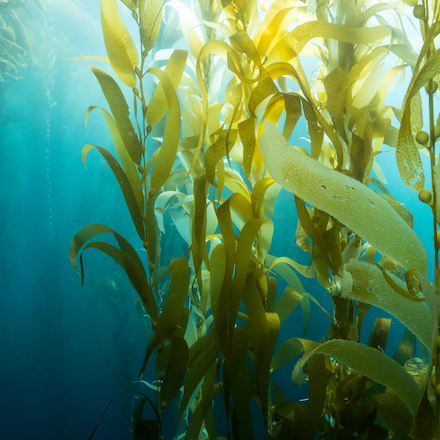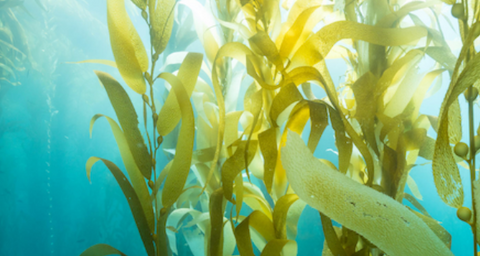
Types of Edible Seaweed and Their Health Benefits
Share
Seaweed, a highly nutritious and sustainable superfood, can offer us a diverse array of health benefits. Rich in vitamins, minerals, and antioxidants, it comes in various forms like Nori, Kelp, Dulse, Wakame, Spirulina, and Chlorella, each with unique nutritional profiles. These seaweeds can contribute positively to heart health, thyroid function, bone strength, and detoxification. Their cultivation is environmentally friendly, requiring no land, freshwater, or fertilizers, and helps in combating climate change by absorbing excess carbon dioxide and nutrients in marine environments. Seaweed's versatility in the culinary world ranges from being a key ingredient in sushi rolls, soups, and salads, to being used as supplements, showcasing its adaptability as a health-boosting and sustainable food choice. Let’s jump in to the different types!
Different Types of Seaweed

- Nori: Widely known for its use in sushi rolls, Nori is rich in protein, fiber, and vitamins A, C, and B12. It's also a great source of iodine, essential for thyroid function.
- Kelp: A brown algae, Kelp is packed with vitamins A, B1, B2, C, D, and E, as well as minerals like zinc, magnesium, and iron. It's particularly noted for its high iodine content, aiding in maintaining a healthy metabolism. Kombu is in this family of seaweed which we use in our healing soups and typically used in Japanese dashi recipes.
- Dulse: This red seaweed is a powerhouse of potassium, iron, and Vitamin B12. Dulse is beneficial for bone health, blood pressure regulation, and improving circulation.
- Wakame: Known for its use in miso soup, Wakame is high in omega-3 fatty acids, calcium, iodine, thiamine, and niacin. It supports cardiovascular health and boosts energy levels.
- Spirulina: Technically a blue-green algae, Spirulina is a protein-rich superfood. It's loaded with B vitamins, beta-carotene, and vitamin E, and is known for its antioxidant and anti-inflammatory properties.
- Chlorella: Similar to Spirulina, Chlorella is a green algae high in proteins, vitamins, minerals, and dietary fiber. It's known for its detoxifying properties, particularly in removing heavy metals from the body.
We use kelp in our vegan "bone broth" which is a base for all of our Dr. Blum's Healing Soups.

Order Seaweed Infused Soups
Sustainability Impact
Have you heard of One Health? Seaweed cultivation stands out as an environmentally friendly and sustainable agricultural practice, primarily due to its minimal impact on the planet's resources contributing to the idea of One Health. Unlike traditional farming, seaweed farming does not require arable land, which means it does not contribute to deforestation or land degradation. This aspect is crucial in today’s context, where land-based agriculture often leads to significant environmental issues like soil erosion and loss of biodiversity. Moreover, seaweed farming does not necessitate the use of freshwater – a critical resource that is becoming increasingly scarce in many parts of the world. This characteristic makes seaweed a highly sustainable crop, especially in regions where water resources are limited. Additionally, the fact that seaweed grows without fertilizers not only reduces water pollution but also avoids the carbon footprint associated with the production and transportation of agricultural chemicals.

The environmental benefits of seaweed farming extend into marine ecosystems as well. Seaweeds are known to play a significant role in nutrient cycling in marine environments. They absorb excess nutrients, such as nitrogen and phosphorus, which can be detrimental to aquatic life when present in high concentrations due to agricultural runoff and other sources. By mitigating nutrient pollution, seaweed helps maintain the balance of marine ecosystems, supporting biodiversity and the overall health of ocean habitats. Seaweed's ability to absorb and sequester carbon dioxide is particularly notable in the context of climate change. As photosynthetic organisms, seaweeds remove CO2 from the atmosphere, contributing to the reduction of greenhouse gases. This process not only helps in combating global warming but also helps to prevent the acidification of oceans, thereby protecting marine life. Thus, seaweed cultivation emerges as a promising solution in the pursuit of sustainable food production and environmental conservation. Amazing right? Now that you're convinced you should use it or integrate it more into your diet, how should you do it?
Some Culinary Uses of Seaweed

- Nori: Perfect for wrapping sushi, adding to salads, or as a crispy snack.
- Kelp: Used in noodles, soups, and as a salt substitute. Kelp powder can be a great addition to smoothies. Found in our Vegan Bone Broth!
- Dulse: Delicious when added to soups, salads, and sandwiches. It can also be pan-fried into crispy chips.
- Wakame: Ideal for soups, salads, and side dishes. It pairs well with cucumber in a refreshing salad.
- Spirulina: Perfect as a supplement in smoothies, juices, or sprinkled over salads.
- Chlorella: Best consumed as a dietary supplement in tablet or powder form.
Putting it into practice
Incorporating these various types of seaweed into your diet can offer numerous health benefits while also supporting sustainable food practices. Whether used as a supplement or a flavorful ingredient, seaweed is a versatile and nutrient-rich addition to a healthy diet. All of our Healing Soups have a seaweed element to them.
